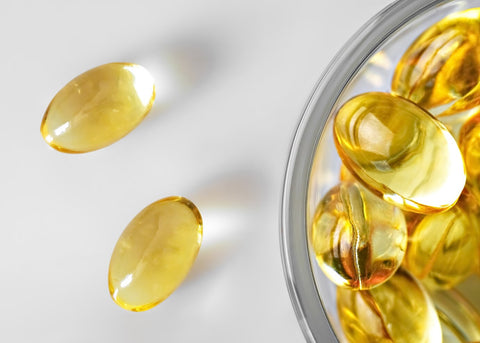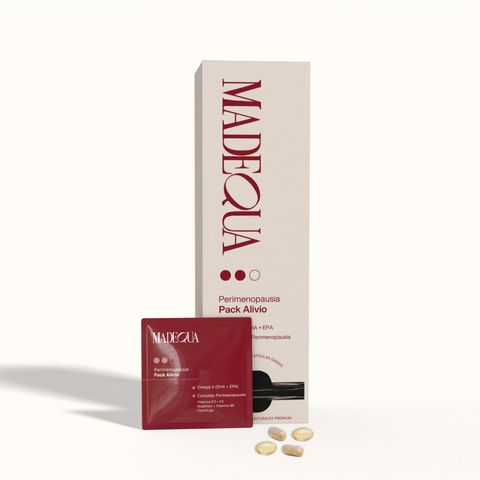Omega-3 is a very useful supplement during menopause due to its benefits in improving cardiovascular, cognitive and skin health, as well as reducing inflammation in menopausal women.
What is Omega-3?
Omega-3 is a polyunsaturated fatty acid that our body needs to function properly and that it cannot produce on its own, which is why it is one of the essential fatty acids.
There are three types of omega-3 fatty acids: alpha-linolenic acid (ALA), eicosapentaenoic acid (EPA) and docosahexaenoic acid (DHA). ALA is found mainly in vegetable oils such as linseed, soybean and canola. DHA and EPA are found in fish and shellfish.
Omega-3s provide calories to give the body energy and are very beneficial for the heart , blood vessels , lungs , immune system and endocrine system (the network of hormone-producing glands).
We talked about how Omega-3 can be beneficial during menopause, but first:
What is Omega-3 good for at this stage?
Omega-3 fatty acids are essential components of cells and play multiple roles in the body. They are crucial for recovery from inflammatory processes, as they have a strong anti-inflammatory effect (mainly DHA). They have antiarrhythmic properties and protect against cognitive decline thanks to their neuroprotective role.
Due to all these properties, Omega-3 contributes to alleviating the symptoms of menopause , protecting the body against cardiovascular diseases , reducing inflammation in the joints, improving brain function and providing significant benefits for the skin. For this reason, it is important to include Omega-3 in our diet .
It is important to note that Omega-3 fatty acids come from polyunsaturated fatty acids and it is essential to obtain them from safe, high-quality sources , as well as considering appropriate dosages and possible drug interactions.
Several studies confirm that Omega-3 provides benefits for women in the menopause stage because this fatty acid is crucial to maintaining a healthy hormonal balance and promoting overall female health.
Cardiovascular health
During menopause, women are at a higher risk of developing cardiovascular disease due to hormonal and metabolic changes. Omega-3 fatty acids, particularly EPA and DHA , have been shown to have protective effects against cardiovascular events such as a myocardial infarction (occurs when the heart does not receive enough blood). This protective effect is attributed to the anti-inflammatory and antiarrhythmic properties of omega-3 .
In turn, Omega-3 supplementation affects the lipids in our body, reducing triglyceride and LDL (“bad”) cholesterol levels and increasing HDL (“good”) cholesterol levels . Lipids are a set of fats that represent important constituents of cells and ensure a source of energy. To maintain good health, it is very important that the levels of these lipids remain within certain limits, since an increase in triglycerides or LDL cholesterol in the blood is associated with a higher risk of developing cardiovascular disease .
Cognitive Health
Supplementation with Omega-3 rich in DHA protects against cognitive decline (alterations in thinking, learning, memory, judgment and decision-making), and neurodegenerative diseases such as Alzheimer's . DHA reaches the brain more effectively than other fatty acids and exerts an anti-inflammatory and neuroprotective effect.
Natural anti-inflammatory
Omega-3 fatty acids, especially DHA, have significant anti-inflammatory properties that benefit pre-, peri-, and post-menopausal women . DHA reduces the levels of molecules responsible for generalized inflammation, common in menopause. Reducing these levels translates into less inflammation and therefore better overall health ( Dyall SC, et al).
Skin health
In addition, it has been observed that supplementation with Omega-3 can improve skin hydration and reduce facial wrinkles.
Foods with Omega-3
There are three main types of Omega-3 fatty acids: alpha-linolenic acid (ALA), eicosapentaenoic acid (EPA) and docosahexaenoic acid (DHA). These compounds can be found in a variety of foods .
Fatty fish
Salmon, trout, mackerel, sardines, herring and tuna are some of the best sources of Omega-3s. In particular, wild Pacific salmon tends to have higher levels of these fatty acids.
Chia and flax seeds
Chia seeds are an excellent plant source of Omega-3, as well as being rich in fiber and antioxidants. Flax seeds, on the other hand, are a source of Omega-3 and dietary fiber with antioxidant properties.
Walnuts
Nuts, especially walnuts, are another good plant source of this fatty acid.
Linseed oil and hemp oil
Flaxseed oil is extracted from flax seeds and is rich in alpha-linolenic acid (ALA), a form of Omega-3. Hemp oil is obtained from hemp seeds and is another plant source of Omega-3.
How much Omega-3 should women take?
To obtain these benefits, it is advisable to include sources of Omega-3 in the diet with a balanced diet or through high-quality supplements, always under the supervision of a health professional, to ensure their safety and effectiveness in the individual context of each woman.
The amount of Omega-3 that a woman needs varies depending on her age and health status , but in general , a daily intake of at least 250-500 mg of EPA and DHA combined is recommended .
Omega-3 Supplements
There are numerous omega-3 supplements on the market, so it is important to choose those that are backed by scientific studies and are trustworthy , so making sure the supplements are certified by regulatory agencies can ensure their quality and safety.
In addition to quality criteria, it is important to consider the recommended amounts of omega-3 for improved overall health.
In terms of safety, few side effects have been reported associated with taking omega-3 supplements and it is important to follow the dosage instructions on the supplement label.
Despite their popularity, it is essential to remember that omega-3 supplements should not replace a balanced and varied diet. It is always better to obtain the necessary nutrients through natural food sources such as fish or seeds.
At Madequa we know that Omega-3 is an essential ally in women's health, regulating hormones, preventing diseases and improving your quality of life. Make sure you include sources of Omega-3 in your diet and consider supplementing with our quality, scientifically proven products with effective doses that you will find in our specific packs for premenopause, perimenopause and postmenopause stages .
References
Bernasconi AA, Wiest MM, Lavie CJ, Milani RV, Laukkanen JA. Effect of Omega-3 Dosage on Cardiovascular Outcomes: An Updated Meta-Analysis and Meta-Regression of Interventional Trials. Mayo Clin Proceedings. 2021;96(2):304-313.
Wei BZ, Li L, Dong CW, Tan CC; Alzheimer's Disease Neuroimaging Initiative; Xu W. The Relationship of Omega-3 Fatty Acids with Dementia and Cognitive Decline: Evidence from Prospective Cohort Studies of Supplementation, Dietary Intake, and Blood Markers. Am J Clin Nutr. 2023;117(6):1096-1109.
Palacios, S., Cancelo, M.J., Castaño, M.R., García, A., De La Gándara, J.J., Pintó, X., Borrego, R.S., Bannenberg, G., & Gil, E. Recommendations for omega-3 intake at different periods of a woman's life. Progress in Obstetrics and Gynecology, 2014; 57(1), 45–51.
Dyall SC, Balas L, Bazan NG, Brenna JT, Chiang N, da Costa Souza F, Dalli J, Durand T, Galano JM, Lein PJ, Serhan CN, Taha AY. Polyunsaturated fatty acids and fatty acid-derived lipid mediators: Recent advances in the understanding of their biosynthesis, structures, and functions. Prog Lipid Res . 2022; 86:101165.
Omega 3, key to treating and reducing the symptoms of menopause. Isanidad. (2022).
Navarra University Clinic. (nd). Foods rich in omega-3. Nutrition and health. https://www.cun.es.




Comments (0)
There are no comments for this article. Be the first one to leave a message!